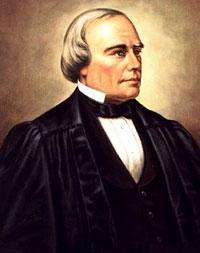The Volokh Conspiracy
Mostly law professors | Sometimes contrarian | Often libertarian | Always independent
Today in Supreme Court History: September 30, 1857
9/30/1857: Justice Benjamin Robbins Curtis resigns from the Supreme Court after Dred Scott v. Sandford (1857).

Editor's Note: We invite comments and request that they be civil and on-topic. We do not moderate or assume any responsibility for comments, which are owned by the readers who post them. Comments do not represent the views of Reason.com or Reason Foundation. We reserve the right to delete any comment for any reason at any time. Comments may only be edited within 5 minutes of posting. Report abuses.
Please to post comments


Lux v. Rodrigues, 561 U.S. 1306 (decided September 30, 2010): Roberts denies injunction requiring Virginia election officials to count Congressional candidate's signatures; signatures had been held invalid because of statute requiring witness to signatures to be from same Congressional District as signers; statute would likely withstand scrutiny even in light of recent case law striking down various petition restrictions (Roberts was proven wrong; the 4th Circuit remanded to the District Court with instructions to evaluate State Interest implications, and the statute was struck down on First Amendment grounds, 842 F. Supp. 2d 895 (E.D. Va. 2012))
Curtis was one of Massachusetts' biggest doughfaces (proslavery Northerners), but Dred Scott gave him a chance to go out on an antislavery note. During the Civil War he criticized the Emancipation Proclamation and the suspension of habeas corpus.
I read his wikipedia biography, but it's pretty bare. Where do you get the "proslavery" adjective? His defense of the slaveowner Aves seems more like a lawyer defending a drunk driver than supporting drunk drivers, his believing the Emancipation Proclamation was unconstitutional was not extreme, and his distaste of Lincoln's ham-handedness wasn't unusual either. None of those show any proslavery attitude that I can see.
“With the rights of [fugitive slaves] I firmly believe Massachusetts has nothing to do. It is enough that they have no right to be *here*…Whatever natural rights they have – and I admit these natural rights to their fullest extent – *this* is not the soil on which to vindicate them. This is *our* soil, sacred to *our* peace, on which we intend to perform *our* promises, and work out, for the benefit of ourselvves and our posterity and the world, the destiny which our Creator has assigned to *us.*”
Benjamin R. Curtis, November 26, 1850, quoted in Albert J. Von Frank, *The Trials of Anthony Burns,* Cambridge, Harvard Universisty Press, 1998, p. 114.
Doesn’t make him proslavery. You can’t judge the past by today’s sensitivities.
Massachusetts was turning against slavery in this period thanks to the increasing aggressiveness of the Slave Power. The Cotton Whig faction associated with Daniel Webster (and Webster’s fan Curtis) flew in the face of Massachusetts opinion. Not modern opinion, mind you, but the opinion of *their own state*. Massachusetts opinion believed that slavery was a bad thing, and that states’ rights meant Massachusetts juries could decide the status of people on its soil who were claimed as slaves. Cotton Whigs like Curtis believed that it exclusively up to the federal administrative state (nonjudicial commissioners) to decide who was a slave and send those adjudged slaves out of Massachusetts and back to their alleged masters.
Theodore Parker complained that Curtis had designated fugitive slaves as foreigners (Von Frank, p. 367, n. 8), which seems correct in light of the way Curtis contrasted “us” and the fugitives. Again, Theodore Parker was a *contemporary* of Curtis, not imposing “today’s sensitivities.”
(Curtis should also be a hero to the modern legal establishment because he said Massachusetts juries could not judge the law in fugitive slave cases)
Curtis took the same position Al Gore took in the Elián Gonzalez case (remember that?).
See the Theodore Parker remark cited above.
Curtis was the first Supreme Court Justice to have graduated from law school. "I'll take SCOTUS potpourri for a thousand, Ken."